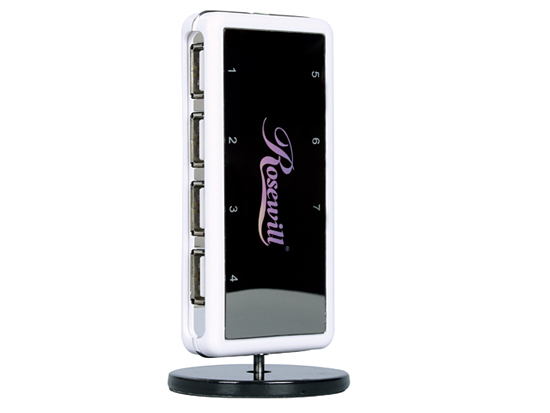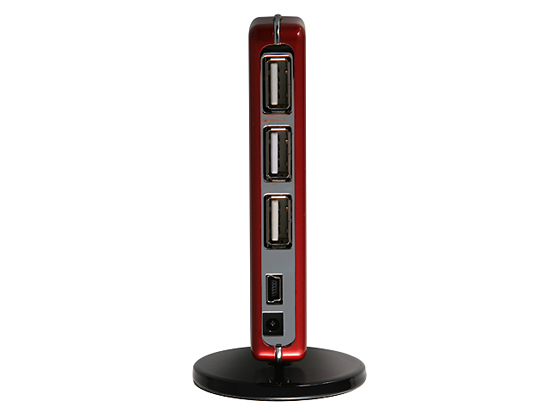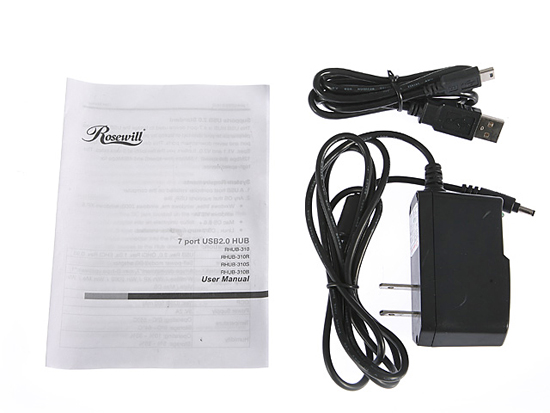Rosewill RHUB-310 - Seven USB 2.0 Ports to Go
by Gary Key on May 13, 2008 12:00 AM EST- Posted in
- Peripherals
Considering the vast amount of USB peripherals available and the seemingly limited number of USB ports on today's notebooks and budget desktop systems, a USB hub seems to be the perfect solution for those who are port challenged. With that in mind, Rosewill is offering an inexpensive and compact solution for those needing to expand their port capabilities without breaking the bank. How well can a cheap USB hub perform compared to a built-in motherboard port, and are there any other concerns? That's what we'll find out today.
The Design

The RHUB-310 Hub is rather unique in its design. Featuring a mirrored faceplate embossed with the manufacturer's name and port numbers, the unit measures just 94.5mm x 45.5mm x 15.5mm without the removable stand. The stand itself is rather heavy and ensures the unit stays in the vertical position with most cable configurations. We did find that removing the stand and laying the unit flat was the best way to go with all seven ports populated. However, there are not any rubber feet to keep the unit from sliding around on the desk in this configuration.

The unit features four USB 2.0 capable downstream ports on the front side and three on the rear section of the unit. The rear section also features the upstream port with a mini B-type cable connection and a DC adapter plug. The top of the unit features a power-on LED, but the port numbers on the faceplate do not light up. Rosewill offers the unit in white, red, and black at this time. The plastic is high quality and defies the $24.99 price tag.

Rosewill includes a short manual, mini B-type cable, and power adapter with the kit. Really, the only design issue we could find here is the mirrored faceplate that attracts and keeps fingerprints - something that may be useful for a CSI team, but we found it annoying as keeping it clean became a priority with us. [Ed: So what if Gary's a bit OCD?]
Let's take a quick look at the performance of this budget wonder hub.










20 Comments
View All Comments
Blain - Saturday, May 17, 2008 - link
I can't imagine what would follow a USB hub review.Maybe an IDE cable "Round-Up"?
Case thumbscrew "Show Down"?
Floppy drive "Face Off"?
Visual - Thursday, May 22, 2008 - link
I could use some articles about those topics.I can very much appreciate rounding your IDE ribbon cables to save space and make them look cooler, also removing the faceplate of your floppy to make it look geeky, but totally can't figure out just who would I show my case thumbscrews to... can't lure anybody close enough for some reason.
cesmadj - Thursday, May 15, 2008 - link
For me this review is quite useful. Over the years I have bought and used several USB hubs that have different problems. Some don't work with different motherboards, some just will not power up a 2,5" external HDD even when powered directly.I buy and recommend many computer related products at work (and to friends) so knowing that there is a hub that WORKS with many peripheries connected is useful knowledge. Besides it's boring to focus only on mobos, CPUs etc.
nubie - Wednesday, May 14, 2008 - link
I don't know, good motherboards come with at least 6, most have 8, and if you have bought one lately it could have 10. I don't see any need for a hub, but then I don't have more than 10 USB devices that "need" connecting all at once.Printer,
gamepad 1,
gamepad 2,
gamepad 3,
gamepad 4,
External HDD,
Music Player,
USB stick 1,
USB Stick 2.
I suppose I could use a USB keyboard/mouse, or an internal SD reader (or my external SD reader).
In reality if I have many gamepads connected, they will go through a $10 unpowered hub just fine, so all of the USB input devices are only using one. But with the current problem of games supporting multiple players (as in: not supporting multiple players, ask me how a PC is not set up for 4 players, their are high-resolution displays, tons of interfaces, multiple displays. Often the Same game is available on a similar platform, AKA X-Box, and has 4 player support, this is BS)
To sum up, I don't know of any reason to own a USB hub personally, due to all of my motherboards having 8 ports, a $2 USB port bracket to bring some of the USB header pins to a rear panel, or front panel, is worthwhile in my view, simply because it makes more sense. Most of the people who "need" these smack their forehead and cry "d'oh" when they realize that there are more front panel ports, and a set of unused header pins internally besides.
I like Rosewill "brand", but I just think USB hubs are stupid (read: inelegant, ugly, redundant, expensive).
In realit
PrinceGaz - Wednesday, May 14, 2008 - link
It's surprising how quickly the devices can add up:Keyboard
Mouse
Gamepad
Printer
Scanner
Modem
UPS communication
Camera cable (not needed all the time but convenient to leave plugged in the PC)
TV-tuner stick
Memory-stick for Vista ReadyBoost
That would be all ten of my ATX mobo USB ports used up (six on the back of the mobo, and two on the front of the case plus another two in a 3.5" drive slot adapter which came with the mobo). And as the TV-tuner stick blocks access to either of the neighbouring front connectors (and it needs to be at the front to receive the IR remote control signal) I would actually need 11 USB sockets.
In reality I connect my keyboard and mouse using PS/2 sockets, my modem by ethernet, and I don't use Vista so no memory-stick for ReadyBoost, but that still comes to six USB devices. Also my monitor has a 2-port hub so that adds one extra socket in total, though I don't use it).
Some budget PCs don't have six USB sockets, and I suspect many laptops have less than six, so there is a market for hubs.
strikeback03 - Wednesday, May 14, 2008 - link
I'm guessing you don't own a laptop, or don't connect much stuff to it. USB hubs are very useful there since laptops don't have many ports, and a hub also makes a cheap docking station in that you can connect a bunch of devices with one plug instead of several, even if the laptop has USB ports to support them.eyeman - Tuesday, May 13, 2008 - link
It's no longer fun waiting almost 2 months for the additional results from the testing of the Western Digital 640GB which would be "coming soon"... Nor for the comparison of the AMD 780G motherboards coming in "the near future" 2 weeks ago now :-(Could you guys please concentrate on what you have begun?
cghebert - Tuesday, May 13, 2008 - link
I very much second that notion.ninjit - Tuesday, May 13, 2008 - link
Did I just read a front-page article on Anandtech reviewing a USB hub????I understand that I (and many other old-time regular readers) are not the target demographic for such things, but I'm having a hard time seeing who is.
My mom would be an example of someone who may need a USB hub, but wouldn't have a clue about what one is or really does, but she also wouldn't care about how many seconds it took to transfer what file, what the real (vs. theoretical) maximum throughput is etc. etc.
And besides, it's a moot point because she would never visit this site in the first place.
I'm not annoyed by this, I'm just very very curious as to your reasoning: is there a new direction Anandtech is heading towards with articles like this?
i.e. more frequent, short and simple reviews of every day devices that might appeal to a broader casual audience? (ala CNET, for example)
DigitalFreak - Tuesday, May 13, 2008 - link
It's interesting in the fact that now I know that this hub will allow me to plug in multiple USB devices and not have them run like crap.